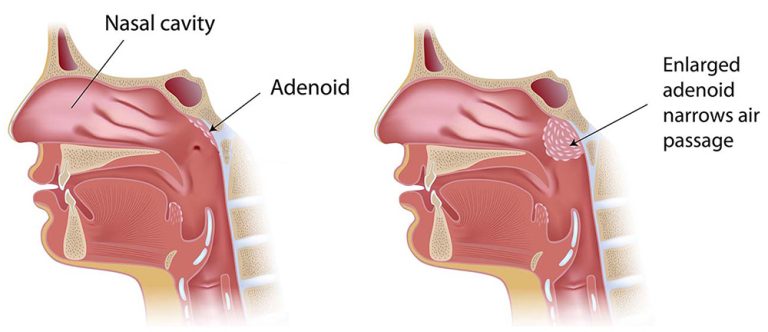Adenoid Symptoms: Hello, I am Op. Dr. Evren Koç . Today I want to tell you about the things you are curious about adenoids and how you can understand this condition better. If you see the above symptoms in your child or yourself, you may be facing an adenoid problem. I have compiled this information that may be important for you. Let’s get started if you want.
Adenoid Symptoms and What You Should Pay Attention to

Adenoid Symptoms
What is Adenoid?
Adenoid is a lymphoid tissue located behind the nose, in the upper part of the throat, and is usually more prominent in childhood. Normally, this tissue, which is part of our immune system, protects our body from external harmful substances. However, in some cases, adenoids can grow and cause various health problems.
Since the adenoid is located at the top of the nose, when it grows, it can cause nasal congestion, ear problems, and even snoring. Although adenoid is more common in children, adults can also experience this problem. The growth of the adenoid sometimes progresses over time without being noticed, so it is very important to pay attention to the symptoms. Adenoid Symptoms
What are the symptoms of adenoid?
When adenoids grow, they can cause a series of symptoms in the body. These symptoms can sometimes be mild, and sometimes they can cause more serious health problems. Now, I will share with you the most common symptoms caused by adenoids. If you notice these symptoms in you or your child, it is important to see a specialist. Adenoid Symptoms
1. Nasal Congestion and Mouth Breathing
Nasal congestion is one of the most common symptoms of adenoids. Adenoids can block the airways behind the nose, causing nasal congestion. Nasal congestion increases especially at night when you go to bed. If your child or yourself constantly breathe through your mouth during the night, this may be a sign of adenoid growth. Mouth breathing is a condition that can be noticed during the day. In other words, if you experience nasal congestion not only at night but also during the day, it may be a condition that you should pay attention to.
2. Snoring and Sleep Apnea
Nighttime snoring is another common symptom of adenoids. If you or your child is snoring, it could be a sign that the adenoids are growing. As the adenoids grow, the airways narrow, causing difficulty breathing during sleep. This can increase snoring. In addition, in some cases, sleep apnea, which is short periods of pauses in breathing during the night, can occur. Sleep apnea is a very serious condition and can negatively affect both physical and mental health if left untreated. If you are experiencing this type of condition, it is very important to see a specialist.
3. Frequent Throat Infections and Tonsillitis
When the adenoids grow, frequent infections in the throat can occur. This can mean that your child will experience frequent tonsillitis. The growth of the adenoids causes the airway between the nose and throat to narrow, which makes it easier for bacteria and viruses to infect. Such frequent infections can lead to a weakened immune system, so it’s important to be careful. Adenoid Symptoms
4. Ear Problems and Hearing Loss
The growth of adenoids can also cause ear problems. Adenoids behind the nose can block the tubes that connect to the ears. This can cause fluid to accumulate in the ear and frequent ear infections. If your child’s ears are frequently infected or has hearing problems, it’s worth checking the adenoids. Hearing loss , especially in children, can affect language development and academic success, so ear problems should be taken seriously. Adenoid Symptoms
5. Constant Cough and Runny Nose
The growth of the adenoids can also increase nasal discharge. In this case, nasal discharge increases especially during the night and the discharge flows into the throat via the nasal passages. This can cause a constant cough. If you have a feeling of stuffiness in the throat or a constant cough after sleeping at night, this may be a sign that the adenoids are growing.
6. Facial Shape Changes and Dental Problems
Long-term adenoid problems can lead to changes in the child’s facial shape. Breathing through the mouth due to nasal congestion can cause the jaw and teeth to not fit properly over time. This can negatively affect the alignment of the teeth and the structure of the jaw. In addition, prolonged mouth breathing can cause the lower jaw to shift forward. Such structural changes may be more noticeable in childhood. Adenoid Symptoms
Adenoid Treatment
Adenoid treatment varies depending on the degree of growth and severity of symptoms. If the adenoid is enlarged and the symptoms mentioned above are present, it is important to consider treatment options. Adenoid Symptoms
- Medication: Adenoid hyperplasia usually cannot be treated with medication, but antibiotics and nasal decongestant sprays may be recommended for symptoms related to infections. These treatments can provide temporary relief.
- Surgery (Adenoidectomy): If the adenoid enlargement is very noticeable and negatively affects the quality of life, the adenoid may need to be removed. This procedure is called an adenoidectomy and is usually recommended for children. The surgery can be performed under local anesthesia and is a very safe procedure. Children breathe more easily after the adenoid is removed and their chances of being protected from infections increase. Adenoid Symptoms
In conclusion…
If you are experiencing symptoms related to adenoids, you are not alone. Many people like you may not notice this condition at the time and experience difficulties in the future. Therefore, it is important to seek help from a specialist whenever you are in doubt .
Remember, adenoids can affect your quality of life as they grow. However, you can overcome this problem with the right treatment methods. If you notice the symptoms we mentioned in this article, I would love to examine you as Op. Dr. Evren Koç and determine the most appropriate treatment options. I wish you healthy days!






